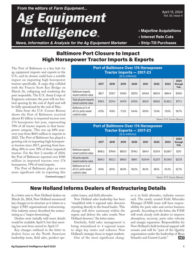One of the things we like about Farm Equipment readers is that they reach out us to let us know where they stand. On the controversial subject of brand purity and major-line contract matters, however, most go “off-record” for fear of reprisal. Yet in recent weeks, we’ve heard from several dealer-principals who want their story told.
That’s because their contracts were cancelled by John Deere at the end of 2009. Across the country, the value of these family-run enterprises vanished with the winter winds.
If you’ve visited www.farm-equipment.com, you’ve seen the dealer-cancellation news. And through the site’s new interactive capability, dealers are weighing in with some strong opinions.
Darwinism is at work in every business, and farm machinery is no exception. But there’s a right, and wrong, way to handle even difficult tasks. I want to share the story of a dealer-principal I spent an hour with on the phone last Saturday morning. You can make up your own mind.
After 40 years of selling John Deere equipment, 79-year-old Willis Schmitt of Schmitt Implement (Holy Cross, Iowa) received a letter saying he was officially “out” as of the end of December.
According to Schmitt (who owns the 13-man store and one other with his son), Deere terminated him over the claim that his store failed to win 40% market share. “Market share was all they had on us,” Schmitt says, admitting that he’s been carrying shortlines for years. “We were never late on payments. I know of no complaints about us in 40 years.”
Several things continue to haunt Schmitt. “We’ve been selling roughly the same amount as 5 years ago, when our market share was 41.9%,” he says. In fact, three of his salesmen won trips to Ireland in recent years for hitting market share targets.
“No one at Deere can tell you how they define market share,” he says. “It’s whatever they want to make it.” He believes Deere wanted to yank his location and manipulated his market share to do so.
“We were calling our TM to order equipment and he’d tell us time and again that no units were available. Yet, I’d see trailers on the highway pulling the same units that we wanted.”
Twice, with the help of customers, Schmitt went around the TM and succeeded in obtaining equipment from Deere’s Lenexa, Kan., office — proving equipment could be found. The discovery of what Deere was doing to him came too late for his store. “Our market share was falling because they kept us from getting equipment to sell,” he concluded.
Adding injury was the fact that his Farm Plan financing was pulled in mid-January — without any notification. “Our customers got letters saying that we weren’t a qualified Farm Plan dealer. No one will call me back and it’s driving business away,” he says, recalling that his was the first dealership in Iowa to offer the Farm Plan program.
While Schmitt will go on with his shortlines and select another tractor brand, he says that he expects to lose 4 months of business opportunity with all that’s involved in exiting Deere and choosing another supplier.
“We’ve got the service trucks, salesmen and a long history with customers. We’ll work our butts off to show that other brands can do the job just as well. And we know you can make as much money selling one independent-branded tractor as you can on 2-3 green ones,” he says.
“Not enough folks will say what’s going on. Most dealers don’t think John Deere would ever do this to them. And it’s a damn shame for those dealers who stay pure green and have nothing else when that letter arrives.”




Post a comment
Report Abusive Comment